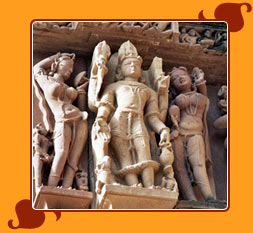Khajuraho, the temple city of central India, is
famous throughout the world for its exquisitely carved temples in stones.
Thousands of visitors and tourists from all over the world flock together to
envisage this immortal saga of Hindu art and culture engraved in stone by
shilpies (stone craftsmen) a millenia ago. Today, apart from the temples,
Khajuraho is a small village but a thousand years ago it was a large city of
the Chandelas, medieval Rajput kings who ruled over Central India.

Khajuraho
is 595 km (370 miles) south-east of Delhi and can be visited by air, rail or
road. An overnight train journey from Delhi takes the visitor to Jhansi,
from where another morning train takes him to Harpalpur 85 km (53 miles) to
the east. A bus or taxi is available from here for Khajuraho which is 98 km
( 61 miles) away via Nowgong and Chattarpur. A direct bus service between
Jhansi and Khajuraho which are 162 km (101 miles) apart is also available
via Mau Ranipur, Nowgong and Chattarpur.
A traveller from
Calcutta, Jabalpur, Varanasi and Allahabad should detrain at Satna on the
Central Railway line and cover the remaining 121 km (75 miles) journey to
Khajuraho by bus or taxi via Panna. Mahoba, a railway station on
Jhansi-Manikpur line, 83 km (52 miles) from Khajuraho is connected by road.
Prime AttractionsTemples of
KhajurahoIt took more than 200 years to complete elaborately carved
Khajuraho temples that are planned in a similar pattern. Built in the
central Indian temple architectural style, the uninhibited and graceful
erotic sculptures of Khajuraho temples are known for their paramount
architectural balance and exquisiteness. The temple plans range from the
simple ones to the most inspired ones. The lovely temples can be divided
into three broad groups, namely, the Eastern group, the Southern group and
the Western group. However, the Western group is not only the largest one
but also the one, which is most easily accessible.
The Eastern
Group takes in five isolated sub-group of temples situated in and around
the present town of Khajuraho. Along with the three Brahmanical temples more
commonly spoken of as temples of Brahma, Vamana and Javari, the three Jain
temples of the deities Ghantai, Adinath and Parsvanath fall under this
group.
The Southern Group is situated at the most distant
location and includes mainly the two temples of Duladeo and Chaturbhuja,
which are situated near and across the Khudarnala.
The Western
Group is the largest of all the temple groups of Khajuraho. It is not
compact and located in the center but also include the most renowned and
noteworthy monuments built during the reign of the Chandela rulers. They are
also known to have been maintained well by the Archaeological Survey of
India and the lush green lawns surrounding them with multihued shrums and
fragrant blossoms add to their beauty. The most prominent temples of the
group are the Lakshmana Temple, the Matangesvara Temple and the Varaha
Temple that are a part of a single complex, the Visvanatha and Nandi temples
situated near the above-mentioned complex and the Chitragupta, Jagadambi and
the Kandariya Mahadeo temples a little to the west of the complex.
How
to Reach By Air: Khajuraho has daily domestic
flights to and from Agra, Varanasi and Kathmandu.
By
Rail:The nearest railway stations to Khajuraho are Mahoba, Satna and
Jhansi. All of these are well connected to most of the major cities of
India.
By Road: Khajuraho has frequent bus
services and good roads to and from the major cities of India including
Panna, Mahoba, Satna, Jabalpur, Bhopal, Gwalior, Indore, Agra and Jhansi.






